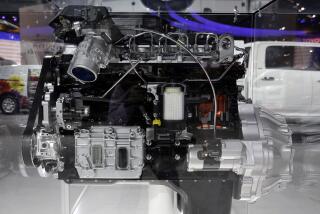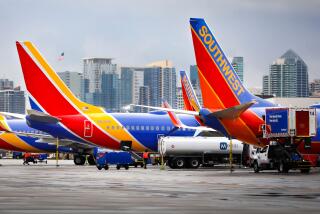Jury Orders Teledyne to Pay $107.3 Million : Aviation: Company is found liable for alleged engine defect in a 1986 plane crash that killed a family of four.
- Share via
In what is the largest product liability award in aviation history, a federal jury in Rochester, N.Y., has ordered Teledyne to pay $107.3 million for producing an allegedly defective aircraft engine that killed a family of four in a 1986 crash.
If it stands, the award will compound Teledyne’s already serious legal problems. Last year, the firm paid a criminal fine of $17.5 million, the biggest for defense fraud in U.S. history. It also faces two government lawsuits that seek damages of more than $100 million each.
Shares of Teledyne, a Los Angeles-based conglomerate, closed Thursday at $20.875, down 12.5 cents. The verdict came after the close of Wednesday’s markets. The engine was produced by Teledyne’s Continental Motors-Aircraft unit in Mobile, Ala.
“The jury verdict and award was totally unexpected and not justified by the facts in the case,” Teledyne spokesman Berkley Baker said. “Teledyne expects to file post trial motions soon. We will be very aggressive.”
Baker added: “The National Transportation Safety Board after its investigation issued a report finding that the accident was not caused by engine failure. That finding was not admissible at the trial.”
Teledyne was found negligent and responsible for a fire that erupted when fuel leaked from an aircraft engine’s nozzle and dripped into the plane’s hot exhaust.
The engine fire forced a crash landing of the four-seat Beech aircraft at Winston-Salem, N.C. The occupants survived, only to be burned to death in the wreckage, according to testimony during the trial. The crash killed the pilot, Robert Gross; his wife, Susan, and their two sons on Nov. 26, 1986.
Gross and his wife were chemists at Kodak. The suit was brought by the beneficiaries of the Gross estate.
Arthur Wolk, a Philadelphia attorney representing the family, said the large jury verdict was based on pain and suffering that occurred during the fire, rather than on punitive damages.
Experts testified that the victims died a slow death, noting that they inhaled smoke that left telltale signs of carbon monoxide in their blood, Wolk said. The pain and suffering awards varied for each individual, based on how long they survived the fire, Wolk said.
Wolk said in an interview that hundreds of Teledyne engines used in small aircraft have experienced fires, but he could not say how many were related to the alleged defect in the Gross case.
In that case, the engine leaked fuel after a nozzle became clogged with carbon particles because the Teledyne engine has a tendency to backfire, Wolk said. When the nozzle became clogged, the backed-up fuel was pushed to the outside of the engine by a stream of air passing through the engine compartment.
Wolk said Gross had repeated problems with the Teledyne engine in his aircraft. Wolk alleged that Teledyne was aware of the problems with the engine and had supplied Gross with the remanufactured engine that was involved in the crash.
More to Read
Inside the business of entertainment
The Wide Shot brings you news, analysis and insights on everything from streaming wars to production — and what it all means for the future.
You may occasionally receive promotional content from the Los Angeles Times.











